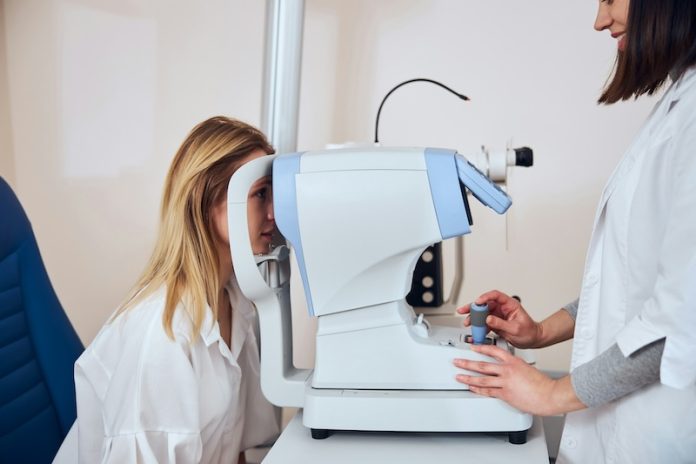
Scientists have made an exciting discovery about how the tiny blood vessels in the back of the eye can tell us a lot about our heart health.
In a recent study conducted by researchers from St George’s and other institutions, they identified 119 specific areas in our DNA that influence the size and shape of these blood vessels.
This discovery could help us better understand the risk factors for high blood pressure and heart disease.
The study focused on the blood vessels in the retina, the part of the eye that receives and processes light. These vessels are crucial because they reflect the condition of blood vessels throughout the body.
By taking a high-resolution image of the retina, doctors can get a clear view of these vessels and assess their size, shape, and even how much they twist and turn.
The eyes are often described as “windows to the body” because they provide a unique way to study blood vessels directly.
In fact, previous research has shown that the characteristics of retinal blood vessels can be linked to various health conditions, such as high blood pressure, heart disease, diabetes, and obesity.
However, until now, scientists didn’t fully understand how our genes influence the architecture of these blood vessels.
In this study, researchers analyzed retinal images from nearly 53,000 people who were part of the UK Biobank, a large health study in the United Kingdom.
They used advanced artificial intelligence (AI) to quickly and accurately identify different types of blood vessels—arteries and veins—and to measure their width and the degree of twisting and turning.
Next, the team conducted a genome-wide association study (GWAS) on the genetic data of these individuals. A GWAS is a method that looks for common genetic factors that may be associated with particular traits, such as the shape or size of blood vessels.
By comparing the DNA of people with similar blood vessel characteristics, the researchers were able to identify 119 regions in the genome that are associated with these traits.
Among these 119 regions, they found that 89 were specifically linked to how much the arteries in the retina twist and turn. This twisting, known as arterial tortuosity, was found to be the most strongly influenced by genetics.
More importantly, the study revealed that people with a higher degree of twisting in their retinal arteries were more likely to have higher diastolic blood pressure (the pressure in the arteries when the heart is resting between beats) and a greater risk of heart disease.
This discovery is significant because it provides new insights into the genetic factors that contribute to heart disease and high blood pressure. Understanding these genetic links could lead to the development of new treatments or prevention strategies in the future.
The findings from this study are a vital piece of the puzzle in understanding how our genes affect the health of our blood vessels, particularly those in the retina.
As we continue to learn more, this research could pave the way for better methods to predict and manage heart disease, potentially even leading to personalized treatments based on an individual’s genetic makeup.
If you’re concerned about your blood pressure or heart health, it’s worth paying attention to other related studies. For example, some research has suggested that frequent naps might be linked to higher blood pressure, while drinking beetroot juice could help lower it.
Additionally, studies have shown that zinc may reduce the risk of death from heart disease, and that intensive blood pressure control can help prevent heart muscle damage.
This study was led by Professor Christopher Owen and his team and was published in the journal PLOS Genetics.
Their work underscores the importance of genetic research in understanding and preventing serious health conditions like heart disease and high blood pressure.
As scientists continue to explore these genetic connections, we may soon have new ways to protect our hearts by looking closely at our eyes.
If you care about health, please read studies about the benefits of low-dose lithium supplements, and what we know about egg intake and heart disease.
For more health information, please see recent studies about potatoes and high blood pressure, and results showing 6 best breads for people with heart disease.
Copyright © 2024 Knowridge Science Report. All rights reserved.



